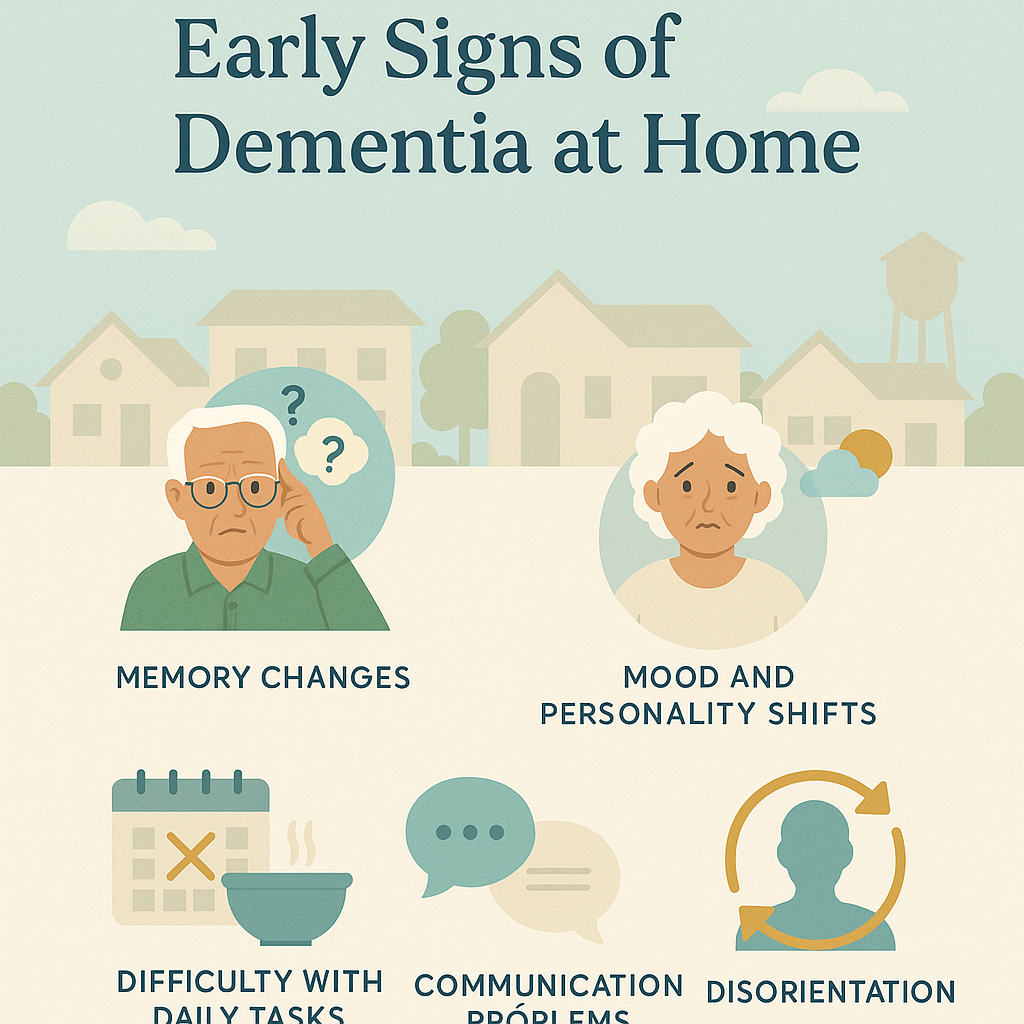
Recognizing the Early Signs of Dementia at Home
Table of Contents
- Understanding Dementia Beyond Forgetfulness
- Early Signs Families Commonly Notice in Daily Life
- Emotional and Behavioral Changes to Watch Closely
- Practical Ways to Respond When Concerns Arise
- When to Consider Professional Support and Memory Care Options
Understanding Dementia Beyond Forgetfulness
When adult children begin to notice changes in a parent, it can be difficult to know what is normal aging and what may be the beginning of something more serious. Dementia is not a single disease, but a collection of symptoms affecting memory, reasoning, and behavior. While forgetfulness is often the first thing people associate with dementia, the reality is much more complex. Families often find themselves second-guessing whether what they see is typical or whether it points to a deeper cognitive change.
This uncertainty can be overwhelming. Many adult children live with quiet worry, afraid to say anything to their parents for fear of upsetting them, yet equally afraid of waiting too long to act. Recognizing early signs at home provides families with a chance to respond sooner, plan thoughtfully, and support their loved one with dignity.
What makes this especially important is how subtle the first signs can be. Early dementia rarely announces itself in dramatic ways. Instead, it shows up in everyday moments: when Mom forgets a familiar recipe, when Dad suddenly struggles with paying bills, or when conversations that once flowed easily become frustrating. These early moments matter, and learning how to identify them is the first step toward ensuring safety and comfort for your parent.
Why Recognizing Signs Early Matters
Spotting dementia early allows families to take advantage of medical evaluations, resources, and senior living options before a crisis forces rushed decisions. In places like Katy, Texas, families often begin exploring support options such as assisted living in Katy TX or memory care in Katy TX only after caregiving at home becomes too difficult. By recognizing early patterns, you can be proactive rather than reactive.
This matters not only for the person experiencing dementia but also for their family members. Caring for a parent while juggling careers and raising children of your own can become overwhelming quickly. Early recognition helps preserve quality of life for everyone involved and opens the door to solutions that provide peace of mind.
The Subtle Shift From Normal Aging
One of the hardest questions adult children ask themselves is: how do I know if this is dementia or just normal aging? Occasional forgetfulness, like misplacing glasses or needing reminders for appointments, is common as we grow older. Dementia, however, goes beyond typical memory lapses. It begins to affect problem-solving, language, judgment, and even personality.
For example, a parent who has always been meticulous with finances might suddenly forget how to balance a checkbook. Someone who has always enjoyed hosting family gatherings may begin withdrawing or showing irritability. These changes are not simply “old age.” They are indicators of shifts in the brain that require closer attention.
Building Awareness Without Panic
It is natural for families to feel fear when the word dementia enters the conversation. However, awareness should not equal alarm. Recognizing the early signs does not mean rushing into a diagnosis on your own. Instead, it means being observant, keeping track of changes, and seeking professional evaluation when patterns emerge.
This balanced approach allows families to support their parents respectfully without creating unnecessary fear. It also helps open the door to honest conversations, which are often the hardest but most important step in planning for the future.
The first step is simply learning what to watch for in daily life. Everyday routines hold clues that can help you distinguish between occasional forgetfulness and potential early dementia. Families who know what to look for feel more prepared and less uncertain about what comes next.
Early Signs Families Commonly Notice in Daily Life
Recognizing early dementia begins with observing patterns in everyday routines. Families often notice small changes first, moments that may seem minor in isolation but reveal a bigger story when they accumulate. Understanding these subtle signs is crucial for adult children living in Katy, TX, who want to support their parents proactively and explore options such as assisted living in Katy TX or memory care in Katy TX before challenges become urgent.
Memory Changes That Stand Out
The most commonly observed sign of early dementia is memory loss that disrupts daily life. Forgetting appointments occasionally is normal, but repeated inability to recall recent events or conversations signals a need for further evaluation. Parents may ask the same questions multiple times, misplace everyday items, or struggle to remember familiar names.
Memory lapses may also show up in ways that are emotionally charged for family members. For instance, a parent who has always remembered family birthdays may start forgetting them, causing frustration or worry. Adult children often notice these discrepancies first because they contrast sharply with what they have always known about their parent’s capabilities.
Challenges with Tasks and Daily Routines
Another key early sign is difficulty completing tasks that were once routine. Cooking familiar meals, balancing checkbooks, managing medication schedules, or following step-by-step instructions can suddenly become confusing. Parents who were once independent may start asking for help more frequently or leave tasks unfinished.
In the Katy, TX area, families frequently report that these changes motivate them to explore assisted living options in Katy TX or to investigate memory care services nearby. Early attention allows parents to maintain dignity while receiving the support they need.
Changes in Language and Communication
Early dementia often impacts language skills. Parents may struggle to find the right word, repeat themselves, or substitute unusual words in conversation. They might also have trouble following complex instructions or maintaining the flow of a discussion. These changes can be subtle but noticeable to adult children who spend time speaking and interacting with their parent.
Communication difficulties are sometimes mistaken for stubbornness or distraction, but when patterns emerge consistently, they warrant attention. Families in Katy, TX, often find that local resources such as memory care programs in Katy TX can provide structured support that helps maintain communication abilities for as long as possible.
Disorientation and Confusion
A parent showing early signs of dementia may become disoriented in familiar places or forget the sequence of everyday tasks. They may lose track of time, forget where they are going, or become confused about the day, date, or season. This disorientation can lead to safety concerns if it is not addressed early.
Observing these signs at home allows families to plan proactive interventions. Simple changes such as establishing routines, labeling household items, or introducing safety measures can prevent accidents and reduce stress for both parents and caregivers.
Subtle Social Changes
Early dementia can also affect social behavior. Parents may withdraw from activities they once enjoyed, avoid family gatherings, or show less interest in conversations. They may become unusually irritable or anxious, creating tension in relationships that were previously smooth.
Adult children who notice these subtle social changes often begin exploring assisted living in Katy TX or community programs to provide structured social engagement. Early involvement in supportive communities helps maintain social connections and reduces feelings of isolation for both parents and their caregivers.
Taking Notes and Tracking Changes
One of the most effective ways to recognize early signs is to keep a careful record. Documenting when changes occur, how often they happen, and what impact they have on daily life can provide clarity and support discussions with healthcare providers.
Families in Katy, TX, frequently use these observations to guide decisions about local services such as memory care in Katy TX or assisted living options nearby, ensuring that they choose the right level of care based on actual needs rather than assumptions.
These subtle but consistent changes offer valuable insights, giving adult children the ability to plan, seek help, and approach their parents with empathy and understanding. Recognizing early signs at home is the foundation for providing the right care and maintaining quality of life for everyone involved.
Emotional and Behavioral Changes to Watch Closely
While memory loss and confusion are the most commonly recognized early signs of dementia, emotional and behavioral changes can be equally telling. Adult children in Katy, TX, often report noticing shifts in mood, personality, or daily behavior before memory issues become obvious. Recognizing these changes at home provides critical insight, helping families respond proactively with both support and compassion.
Mood Shifts That May Signal Cognitive Change
One of the first emotional signs families notice is a change in mood. Parents who were once cheerful and patient may become irritable, anxious, or unusually sad. These mood changes can occur suddenly or gradually, and they often fluctuate throughout the day.
Mood shifts can be subtle. A parent may grow frustrated over minor inconveniences, snap at family members without cause, or seem unusually nervous about leaving the house. Adult children may feel confused or guilty, unsure whether the behavior is a temporary reaction to stress or an early indicator of dementia. Observing the frequency, duration, and intensity of these changes can provide important clues.
Personality Changes and Withdrawal
Dementia can affect personality, leading to behaviors that feel unfamiliar. A parent who has always been outgoing may start avoiding social interactions. Someone who was meticulous may become careless or indifferent about household tasks. These shifts can be difficult for families, as they challenge long-standing perceptions of a loved one’s identity.
Social withdrawal is particularly common. Parents may decline invitations to family events, stop participating in hobbies, or isolate themselves in their rooms. Adult children often notice these changes first and may wonder if they are a sign of depression, stress, or dementia. When withdrawal coincides with other early warning signs, it becomes a signal that closer evaluation is necessary.
Anxiety and Agitation
Anxiety is another subtle but important sign. Parents may express worries about leaving home, misplacing items, or forgetting appointments. These anxieties are often disproportionate to the situation and may occur repeatedly.
Agitation can also present as restlessness, pacing, or repeating questions and statements. Families in Katy, TX, often report that these behaviors intensify when routines are disrupted or when a parent is left alone for extended periods. Recognizing these patterns allows caregivers to implement supportive routines and consider professional memory care options before behaviors escalate.
Uncharacteristic Irritability or Suspicion
Some parents may develop mistrust or suspicion toward family members or caregivers. This can manifest as accusations, reluctance to accept help, or unnecessary worry about safety and finances. While these behaviors can be upsetting, they are often rooted in cognitive changes rather than intent.
Early recognition of irritability or suspicion is essential. Families can adjust communication approaches, introduce structured routines, and explore assisted living in Katy TX or memory care in Katy TX to provide a safe and supportive environment. These strategies reduce stress for both parents and caregivers, improving daily life for everyone.
Understanding Emotional Changes as Part of Dementia
Emotional and behavioral changes are not isolated symptoms; they interact with memory loss, confusion, and daily challenges. A parent who struggles to remember appointments may become anxious, withdrawn, or frustrated. Recognizing the link between cognitive changes and emotional responses helps families approach caregiving with empathy rather than frustration.
Documenting these changes over time provides a clearer picture for healthcare professionals, enabling timely interventions. In Katy, TX, families often use this information when considering local senior living options, ensuring that their loved ones receive care tailored to both cognitive and emotional needs.
Supporting Your Parent Through Emotional Shifts
Families can respond to early emotional changes with practical and compassionate strategies:
- Maintain consistent daily routines to reduce confusion and anxiety
- Encourage social engagement through local community programs or senior centers
- Introduce memory aids such as calendars, reminders, and labeled household items
- Seek professional evaluation to rule out treatable causes and discuss next steps
By addressing emotional and behavioral changes early, adult children create a foundation of stability and support. This not only improves the well-being of their parents but also reduces caregiver stress and prepares the family for future care decisions.
Practical Ways to Respond When Concerns Arise
Recognizing the early signs of dementia is only the first step. Adult children in Katy, TX, often feel uncertain about what to do next. Balancing concern for a parent’s independence with the need for safety and support can be emotionally challenging. Fortunately, there are practical, compassionate steps families can take to respond effectively while maintaining trust and dignity.
Start With Open, Supportive Conversations
The first step is often the hardest: talking to your parent. Approach conversations with empathy, using gentle language that expresses concern rather than judgment. For example, rather than saying, “You’re forgetting too much,” consider framing observations as shared experiences: “I noticed you seemed confused about your appointments this week. How can I help?”
Open dialogue allows parents to participate in planning, which preserves autonomy and reduces resistance. Adult children in Katy, TX, report that approaching these discussions with patience and clarity strengthens relationships and lays the groundwork for future care decisions.
Keep Detailed Notes of Observations
Documenting changes in memory, behavior, and daily routines is essential. Keeping a journal of what you observe and when helps identify patterns over time. This record becomes invaluable during conversations with healthcare professionals, who rely on concrete examples to evaluate cognitive health accurately.
When visiting clinics or discussing care options, families in Katy, TX, can use these notes to ask informed questions, such as “How do I know if my parent needs memory care?” or “Are these behaviors typical for early-stage dementia?”
Seek Professional Evaluation
Early evaluation by a qualified healthcare professional is crucial. A primary care physician, neurologist, or geriatric specialist can perform cognitive assessments, rule out other causes of memory changes, and recommend treatment or interventions.
Families in Katy, TX, often schedule appointments at local clinics specializing in senior care. These evaluations provide clarity and peace of mind, helping adult children make decisions based on evidence rather than anxiety or guesswork.
Introduce Home Support and Safety Measures
While exploring professional care options, families can implement practical changes at home:
- Create structured daily routines to reduce confusion
- Use labels, calendars, and reminders to support memory
- Ensure safety in common areas to prevent falls
- Simplify financial and household management with checklists or automated systems
These strategies help maintain independence while reducing stress for both parents and caregivers. In Katy, TX, home modifications and supportive routines can bridge the gap until families are ready to explore assisted living in Katy TX or memory care in Katy TX.
Explore Senior Living Options Early
Even at the first signs of cognitive decline, considering local senior living options is a proactive step. Assisted living in Katy TX provides daily support for routine tasks while allowing residents to maintain independence. Memory care in Katy TX offers specialized programs designed for individuals with dementia, combining safety, structured activities, and professional care.
Visiting communities early allows families to ask important questions, such as:
- What level of support is available for daily living tasks?
- How does the community address memory care and cognitive support?
- What is the cost, and what financial options are available?
- How are social and recreational activities tailored to residents with cognitive changes?
Taking the time to research and tour local options ensures families make informed choices that align with both their parent’s needs and their own peace of mind.
Balancing Support With Independence
Perhaps the most important principle is balance. Providing support does not mean taking over entirely. Adult children should aim to assist where needed while encouraging autonomy, allowing their parents to feel valued and capable.
For example, letting a parent handle simple tasks while supervising subtly maintains confidence. Encouraging participation in social activities or hobbies, whether at home or in a community setting, preserves cognitive engagement and emotional well-being.
By combining compassionate communication, careful observation, professional guidance, and thoughtful planning, families in Katy, TX, can respond to early signs of dementia confidently and effectively. These steps create a pathway to safety, stability, and dignity, setting the stage for long-term care decisions that meet both practical and emotional needs.
When to Consider Professional Support and Memory Care
Understanding the early signs of dementia is only part of the journey. Adult children in Katy, TX, often face the emotional challenge of deciding when to seek professional care. Recognizing the point at which home support is no longer sufficient can be difficult, but taking proactive steps ensures safety, quality of life, and peace of mind for both parents and families.
Indicators That Professional Support May Be Needed
While every family’s situation is unique, certain signs indicate that it may be time to consider professional assistance:
- Increasing frequency or severity of memory lapses that interfere with daily life
- Trouble managing medications, finances, or household tasks
- Repeated disorientation or getting lost in familiar environments
- Significant personality or mood changes causing distress for the parent or family
- Safety concerns, such as falls, wandering, or accidents at home
Noticing these patterns does not mean your parent has reached a crisis. Rather, it provides an opportunity to explore supportive options while preserving independence and dignity.
Assisted Living and Memory Care in Katy, TX
For families in Katy, TX, early research into local options can prevent last-minute decisions during stressful situations. Assisted living in Katy TX offers daily support with meals, housekeeping, medication management, and social engagement. Memory care in Katy TX provides specialized programs for residents with cognitive decline, combining structured activities, professional oversight, and a secure environment.
Visiting communities early allows families to ask the right questions and assess whether the services match their parent’s needs. Key considerations include staffing ratios, types of cognitive programs, recreational opportunities, and approaches to personal care.
Balancing Family Involvement With Professional Care
Even when professional care is introduced, family involvement remains critical. Adult children can continue to participate in decisions, provide emotional support, and maintain meaningful connections. Involving parents in the process—visiting communities together, discussing routines, and planning activities—helps reduce resistance and fosters a sense of control.
Frequently Asked Questions About Early Signs of Dementia
What are the earliest signs of dementia to watch for at home?
Early signs often include memory lapses that interfere with daily life, difficulty managing familiar tasks, changes in language and communication, disorientation, and shifts in mood or personality. Subtle changes in social behavior or independence can also be indicators.
How can I tell the difference between normal aging and early dementia?
Normal aging may involve occasional forgetfulness, slower processing speed, or minor lapses in focus. Dementia affects daily functioning, problem-solving, language, and emotional regulation in ways that are progressive and noticeable over time. Keeping a journal of observations can help identify patterns.
When should I seek professional evaluation for my parent?
If memory issues, confusion, or behavioral changes interfere with safety, independence, or daily routines, it is time to schedule a professional evaluation. Early assessment allows for medical guidance, treatment planning, and access to support services.
What questions should I ask on a senior living tour in Katy, TX?
Ask about staffing ratios, memory care programs, activities, healthcare support, safety measures, costs, and family involvement opportunities. Understanding how a community supports cognitive and emotional needs helps families choose the right environment.
How much does assisted living cost in Katy, TX?
Costs vary depending on the level of care, amenities, and apartment size. Adult children should request detailed pricing information, inquire about what is included, and ask about financial assistance options or long-term care insurance coverage.
When is memory care the right choice?
Memory care is appropriate when a parent requires specialized support for dementia, including structured routines, cognitive engagement programs, and enhanced safety measures. Early placement can improve quality of life and reduce stress for both residents and family caregivers.
How can I support my parent’s independence while considering memory care?
Encourage participation in daily routines and decision-making, involve them in selecting their living arrangements, and maintain regular visits and communication. Combining professional support with family involvement preserves autonomy and emotional well-being.
What local resources are available in Katy, TX, for dementia support?
Families can access assisted living in Katy TX, memory care in Katy TX, senior centers offering social and cognitive programs, local healthcare providers specializing in geriatrics, and caregiver support groups. Early research helps families plan proactively.
By recognizing early signs of dementia, documenting patterns, and exploring professional support, families in Katy, TX, can make informed decisions that prioritize safety, independence, and quality of life. Early intervention, whether through home strategies or assisted living and memory care, ensures parents receive compassionate care while providing peace of mind for adult children navigating this challenging journey.



